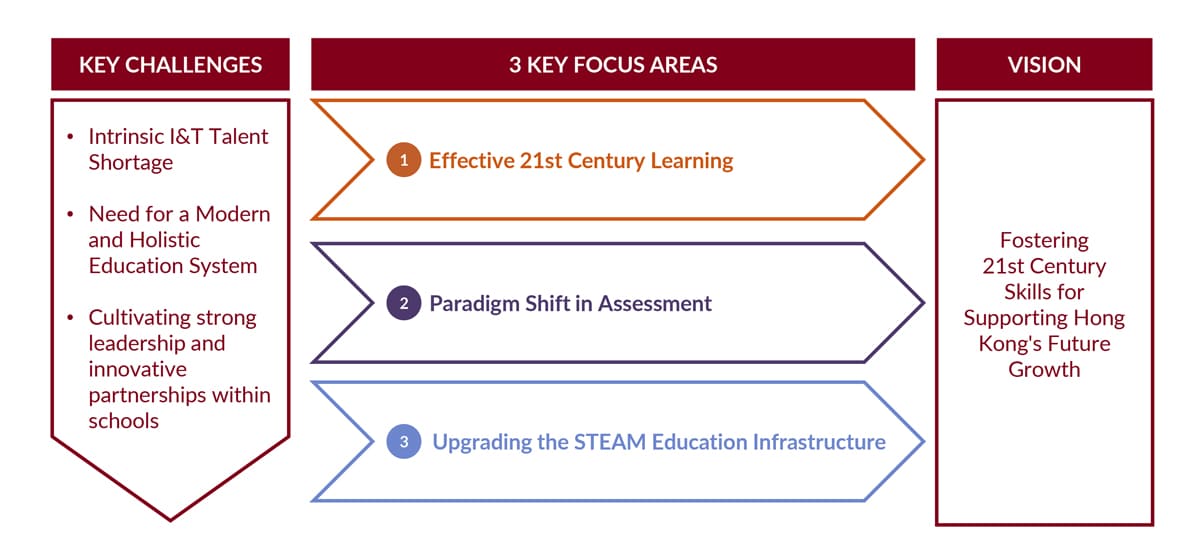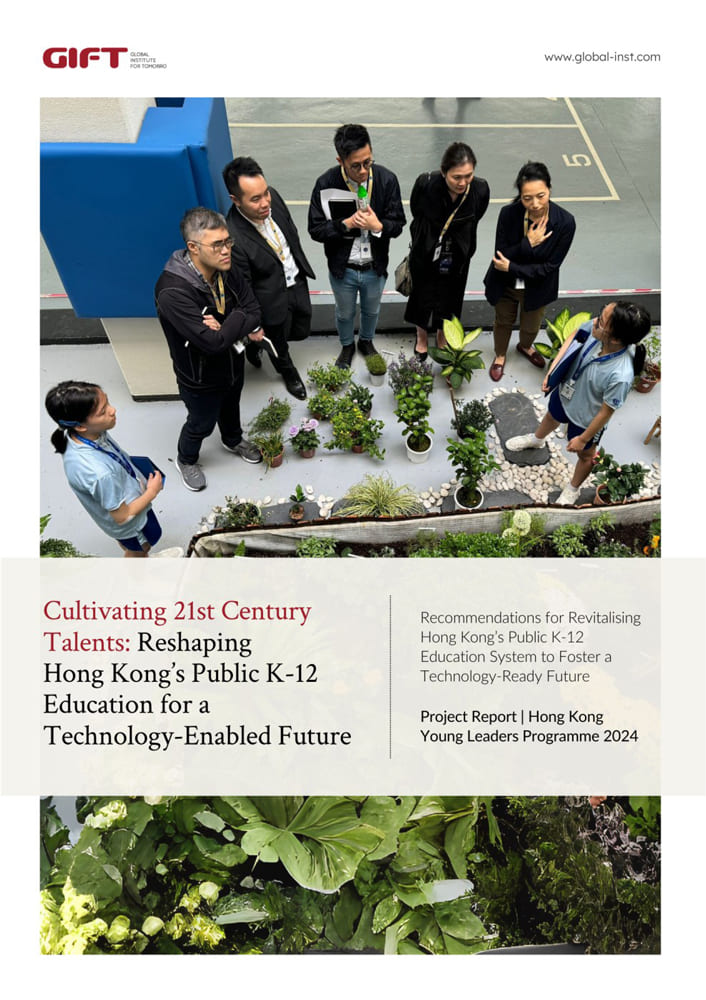The future is increasingly complex and unpredictable, driven by different factors including the rapid emergence of groundbreaking technologies. For Hong Kong to establish itself as an international Innovation and Technology Hub (I&T Hub) in alignment with the city’s developmental vision, success will hinge on cultivating a strong pool of talented professionals who possess foresight, complex problem-solving skills, and competencies such as resilience.
The city’s chronic talent shortage indicates a need for the K-12 education system to adapt in order to develop competent graduates. This report proposes a revitalisation of the public K-12 education system, with a central theme of enhancing students’ technological readiness for the future. The three key policy recommendations include:
1. Effective 21st Century Learning: To equip students with the necessary skills to thrive in the 21st Century, and to move away from the teacher-centred pedagogical approach that may result in passive learning.
- Students – Implementing project-based learning (PBL)
Introduce PBL as a core component of the curriculum through a progressive 6-year implementation across all K-12 schools in Hong Kong. This timeline will facilitate buy-in from both students and teachers, thereby enhancing their confidence in fully adopting PBL within the curricula. - Teachers – Building PBL teaching capacity
Equip educators with the facilitation skills and dynamic teaching methodologies essential for the PBL pedagogical approach. Comprehensive support will include a revitalisation of standards and training programmes, such as the teacher certification curriculum (PGDE/BEd) and the professional development standards (“TStandard”), to ensure that educators are adequately prepared to implement PBL effectively.
2. Paradigm Shift in Assessment: To transition from a solely knowledge-based, exam-orientated assessment model towards a more holistic assessment approach, focusing on students’ competency and soft skills development.
- Competency-based Assessment
Develop a competency-based assessment system within the curriculum from Primary 1 (P.1) to Secondary 6 (S.6), focused on 21st Century skills and PBL. - Continuous Assessment
Realign the HKDSE score weighting to enhance the significance of continuous assessment, rewarding skill progression and development rather than placing a sole emphasis on final outputs. - Learning & Teaching Evaluations
Strengthen the breadth and coverage of learning and teaching performance evaluations, ensuring that appraisal feedback are connected to teachers’ professional development.
3. Upgrading the STEAM* Education Infrastructure: To provide systematic professional development for teachers and facilitate the real-life application of STEAM knowledge by establishing a long-term school-industry infrastructure.
- Empower Schools with On-Site STEAM Specialist:
A STEAM specialist that is distinctfrom teachers, with an integral role in advancing PBL and STEAM methodology, certified by local universities, to be introduced in each primary school and secondary school for the enhancement of STEAM’s integration across different subjects. - Establish STEAM Training Centres in Universities:
Establish dedicated STEAM Training Centres in selected universities to provide STEAM education to all teachers and to develop STEAM specialists based on their professional goals and career stages. - Introduce CollaborativeDigital Platform – “CODES”:
Leverage the Business School Partnership Programme (BSPP) to introduce a digital platform via a new statutory body – CODES (Collaborative Opportunities for Development in Education and STEAM) – to enhance STEAM education by fostering collaboration among K-12 schools, higher education institutions, education technology (Ed-tech) companies, and industry partners. - Management & Operation of the CODES Statutory Body:
Implement compulsory school-industry partnerships by integrating at least one PBL course with an industry partner into the curriculum for S.4-S.5 students, positioning the CODES statutory body as the central body for facilitating these partnerships. - Integrate GBA resources into CODES:
Integrating Great Bay Area (GBA) resources into the CODES platform through a cross-border Government-Enterprise STEAM scheme, to foster collaboration with GBA stakeholders to provide mentorship and resources for STEAM* education, and encourage students to participate as STEAM ambassadors.

STEAM* = Science, Technology, Engineering, Arts, Mathematics
The following policy recommendations are centred on three Key Focus Areas: Effective 21st Century Learning, Paradigm Shift in Assessment, and Upgrading the STEAM Education Infrastructure. The following diagram illustrates how this policy proposal relates to the current challenges, and the roadmap for achieving the Vision: Fostering 21st Century Skills to Support Hong Kong’s Future Growth.


